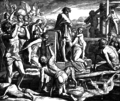Portal:Cities
The Cities Portal

A city is a human settlement of a notable size. The term "city" has different meanings around the world and in some places the settlement can be very small. Even where the term is limited to larger settlements, there is no universally agreed definition of the lower boundary for their size. In a more narrow sense, a city can be defined as a permanent and densely populated place with administratively defined boundaries whose members work primarily on non-agricultural tasks. Cities generally have extensive systems for housing, transportation, sanitation, utilities, land use, production of goods, and communication. Their density facilitates interaction between people, government organizations, and businesses, sometimes benefiting different parties in the process, such as improving the efficiency of goods and service distribution.
Historically, city dwellers have been a small proportion of humanity overall, but following two centuries of unprecedented and rapid urbanization, more than half of the world population now lives in cities, which has had profound consequences for global sustainability. Present-day cities usually form the core of larger metropolitan areas and urban areas—creating numerous commuters traveling toward city centres for employment, entertainment, and education. However, in a world of intensifying globalization, all cities are to varying degrees also connected globally beyond these regions. This increased influence means that cities also have significant influences on global issues, such as sustainable development, climate change, and global health. Because of these major influences on global issues, the international community has prioritized investment in sustainable cities through Sustainable Development Goal 11. Due to the efficiency of transportation and the smaller land consumption, dense cities hold the potential to have a smaller ecological footprint per inhabitant than more sparsely populated areas. Therefore, compact cities are often referred to as a crucial element in fighting climate change. However, this concentration can also have some significant negative consequences, such as forming urban heat islands, concentrating pollution, and stressing water supplies and other resources. (Full article...)
Selected city -
Seattle (/siˈætəl/ see-AT-əl) is a seaport city on the West Coast of the United States. It is the seat of King County, Washington. With a 2023 population of 755,078 it is the most populous city in both the state of Washington and the Pacific Northwest region of North America, and the 18th-most populous city in the United States. The Seattle metropolitan area's population is 4.02 million, making it the 15th-largest in the United States. Its growth rate of 21.1% between 2010 and 2020 made it one of the country's fastest-growing large cities.
Seattle is situated on an isthmus between Puget Sound, an inlet of the Pacific Ocean, and Lake Washington. It is the northernmost major city in the United States, located about 100 miles (160 km) south of the Canadian border. A gateway for trade with East Asia, the Port of Seattle is the fourth-largest port in North America in terms of container handling . (Full article...)Did you know -
- ... that Broadway's Lyric Theatre, once deemed a "cursed" theater, now hosts The Cursed Child?
- ... that graffiti artist Al Diaz cuts up New York metro signs and reconfigures the letters into his own text?
- ... that the New York City government sought to demolish a wall around the Isaac L. Rice Mansion for five years?
- ... that the game MicroMacro: Crime City was so popular after its release that print runs repeatedly sold out for eight months?
- ... that until the opening of Altay railway station in June 2017, no railway services were provided to Altay City, a tourist attraction with rich mineral resources?
- ... that Lucy Feagin founded the Feagin School of Dramatic Art in New York City, where talent scouts for radio, screen, and stage were always present to watch her senior students' plays?
Related portals
Related WikiProjects
Cluj-Napoca (Romanian: [ˈkluʒ naˈpoka] ), or simply Cluj (Hungarian: Kolozsvár [ˈkoloʒvaːr] , German: Klausenburg), is a city in northwestern Romania. It is the second-most populous city in the country and the seat of Cluj County. Geographically, it is roughly equidistant from Bucharest (445 kilometres (277 miles)), Budapest (461 km (286 mi)) and Belgrade (483 km (300 mi)). Located in the Someșul Mic river valley, the city is considered the unofficial capital of the historical province of Transylvania. For some decades prior to the Austro-Hungarian Compromise of 1867, it was the official capital of the Grand Principality of Transylvania.
, 286,598 inhabitants live in the city. The Cluj-Napoca metropolitan area had a population of 411,379 people, while the population of the peri-urban area is approximately 420,000. According to a 2007 estimate, the city hosts a visible population of students and other non-residents, an average of over 20,000 people each year during 2004–2007. The city spreads out from St. Michael's Church in Unirii Square, built in the 14th century and named after the Archangel Michael, Cluj's patron saint. The municipality covers an area of 179.52 square kilometres (69.31 sq mi). (Full article...)Selected article -

The economy of Dubai’s gross domestic product of the calendar year 2023 as of January 2024 is AED 429 billion ($USD 116,779 billion). Dubai has substantially transformed over the last couple of decades. More than 90% of the population are foreigners.
The International Herald Tribune described it as "centrally-planned free-market capitalism". Oil production, which once accounted for 50% of Dubai's gross domestic product, contributes less than 1% today. In 2018, wholesale and retail trade represented 26% of the total GDP; transport and logistics, 12%; banking, insurance activities and capital markets, 10%; manufacturing, 9%; real estate, 7%; construction, 6%; tourism, 5%. (Full article...)General images -
Topics
List articles
Subcategories
Associated Wikimedia
The following Wikimedia Foundation sister projects provide more on this subject:
-
Commons
Free media repository -
Wikibooks
Free textbooks and manuals -
Wikidata
Free knowledge base -
Wikinews
Free-content news -
Wikiquote
Collection of quotations -
Wikisource
Free-content library -
Wikiversity
Free learning tools -
Wiktionary
Dictionary and thesaurus









































